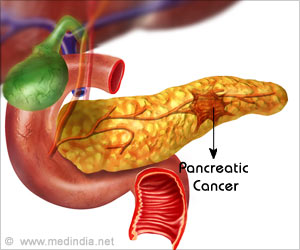Metastasis of Pancreatic Cancer due to DNA changes maybe reversed using drug 6-aminonicotinamide. The research answer the poorly understood question about metastatic cancer biology.
- A research team has found that epigenetic changes are associated with certain forms of pancreatic cancer that are known to spread to other organs like lung and liver.
- Metastatic cancer consume more glucose than local tumors
- 6-phosphogluconate dehydrogenase enzyme fuelled metastasis
- Drug 6-aminonicotinamide reversed the epigenetic changes
Study on DNA changes in Pancreatic Cancer
A research team comprising of scientists from various centers has found that a complete genome analysis of tumor samples from people who died of pancreatic cancer were associated with certain chemical changes in the DNA. These changes did not alter the sequence but they influenced how the DNA functions along with the survival advantages that occurred in certain types of pancreatic cancer. These advantages aided the cancer cells in surviving in organs like the lungs and the liver, where there is ample supply of blood. The study was published in the journal Nature Genetics.Drug to Reverse the Changes
A drug that is still in the experimental stage has been found to reverse these epigenetic changes and was found to block the growth of tumor in pancreatic cancer cell lines. The scientists hope that such studies will aid in providing an effective treatment against the development of metastatic pancreatic cancer.Tumor samples from 8 patients with pancreatic ductal adenocarcinoma, which is the most common form of cancer, was collected soon after the death of these patients. The samples were collected form the primary source of tumor, which was in the pancreas or at a site close to the pancreas.
Analysis of the Tumor Genomes
The genetic mutations in the tumor genomes analyzed to identify the genetic mutations, or changes in the DNA. In an associated study, the researchers reported that they did not find any genetic mutations which were linked directly linked were responsible for the metastases.Since there were no genetic alterations hat were identified, the team of researchers looked for other changes that could possibly influence the spread of the tumor cells. The research group looked for epigenetic changes that altered the expression levels of various genes, thereby playing a role in the working of the DNA. A combination of stains that were found in the patient tissues as well as the examination of proteins that bind DNA along with whole genome sequencing were studied to identify epigenetic changes and where they were located.
There were no major changes that were noticed among cancer patients who had local tumor, but there were major epigenetic changes identified among pancreatic cancer patients who showed metastasis with spread to the lung and liver.
Universal Across Tumors
The group of researchers identified block-like segments in which there were epigenetic changes and these changes could be universal and could include different types of cancers. The researchers state that though this idea hasn’t yet been tested, there are similar epigenetic changes in similar regions have been identified in other types of cancer.Sugar Hungry
The research team tried to identify what controlled the epigenetic changes. They found that in cancer metastasis, the cells targeted organs that were sugar rich, this lead the researchers to tumor cells had altered the way the tumor cells use basic forms of sugar.Biochemical tests showed that tumors that metastasized consumed a lot more sugar than tumors that were localized. They found that
- Metastatic cancers promoted growth via the metabolic reaction called the pentose phosphate pathway
- This pathway aids in burning or oxidizing glucose-derived molecules and converting them into building blocks for tumors.
- The enzyme 6-phosphogluconate dehydrogenase (PGD) was found to be very important in the pathway
Rapid Growth of the Metastatic cancer
In pancreatic cancer, it has always been found that the initial primary tumor grows very slowly, taking a long time to develop. However, metastasizing cancer progresses very fast and this has always been a mystery for researchers. The alterations in the utilization of glucose, the researchers believe, could be the answer behind this difference.6-aminonicotinamide
The scientists needed to ascertain if PGD and the pentose phosphate pathway did play a significant role in cancer metastasis and this was carried out by using a drug that would inhibit PGD. The drug 6-aminonicotinamide (6AN), that inhibits the action of PGD but is currently not used in humans as it is known to cause side effects, was administered to cells showing metastasizing cancer. This drug was found to reverse the epigenetic changes that were identified in cells showing metastasis.6-aminonicotinamide was found to
- Decrease the activity of genes that were associated with malignant functions, which included cell cycle control and DNA repair.
- The drug strongly blocked the formation of tumor in distant metastases and this was reported from three different laboratories.
The study provides clues to the important of the pentose phosphate pathway and, though further research is required, it could provide better drug targets for therapy of pancreatic cancer, especially for forms that lead to aggressive metastasis.
Source-Medindia
















